
Create unique and comprehensive "electrical" drug profile using the microelectrode array technology and our automatic analytical pipeline. Our methodology is optimized to reach >90% success rate to get high-quality raw signals at the stomach and intestines in small animals, mainly from a vomit-capable shrew model (Suncus murinus). The technology has been peer-reviewed in >6 publications. Recorded signals had been validated by electrophysiological properties of slow wave activity including temperature sensitivity, ionic dependency, and pharmacological effects, etc. (See our published research). The fastest speed to create one full drug testing report is one day, where the report includes 60 datasets tested on 4 gut tissue types (stomach, duodenum, ileum and colon), 3 different concentrations and with 6 experimental repeats for each testing condition. Data reproducibility is also validated: similar drugs acting on similar receptors tested separately for over a year can be clustered together by a non-supervised AI learning model. Using this methodology, we have now tested >250 drugs (Updated in Jan 2024)!
Learn more about our service
Database Subscription

Our R&D progress will continue to update new drug profiles into our sustainable "bio-electrical" drug database. Each drug profile stores >100 bio-electrical signal features of gastrointestinal pacemaker activity. All profiles are created using a standardized methodology, allowing highly consistent and reliable drug-to-drug comparison analysis. We are expanding the datatype stored in our database by testing more dependent variables (e.g. animals, sex, age, temperature, pathological conditions, etc.) and translating our technology to other tissue types (uterus, gallbladder, bladder, esophagus, etc.). This novel drug database is expected to evolutionize AI drug discovery.
View our database
Drug Predictions

Our newest AI prediction models reaches >90% precision in predicting drug adverse effects like vomiting, nausea, diarrhoea, abdominal pain, dizziness, rash, dermatitis, chest pain, oedema, gastrointestinal disorder, paraesthesia, shock, etc. The prediction can go beyond other non-gut-related adverse effects, including cardiac, immuno, and psychological disorders (See our published research). How can that be!? This is because similar receptors or ion channels are expressed in the gut and other organs, e.g. serotonin (5-HT) controls gut motility as well as our emotions. We can now help pre-clinical drug developers to predict potential failures in advance, get well-prepared for higher success rate in clinical trials, and get the best MVP drug candidates with good curing effects and lower side effects for helping patients!
Contact us to know more!